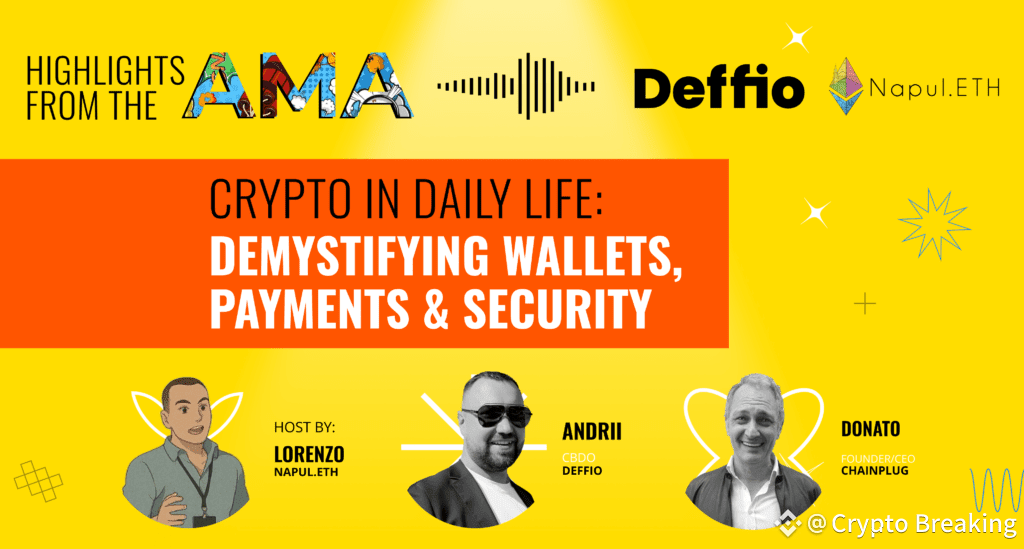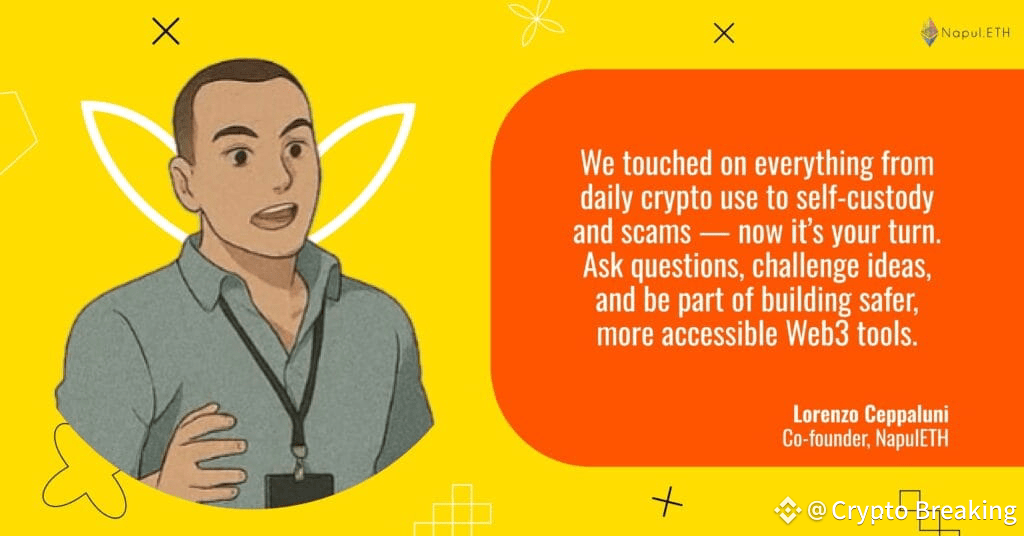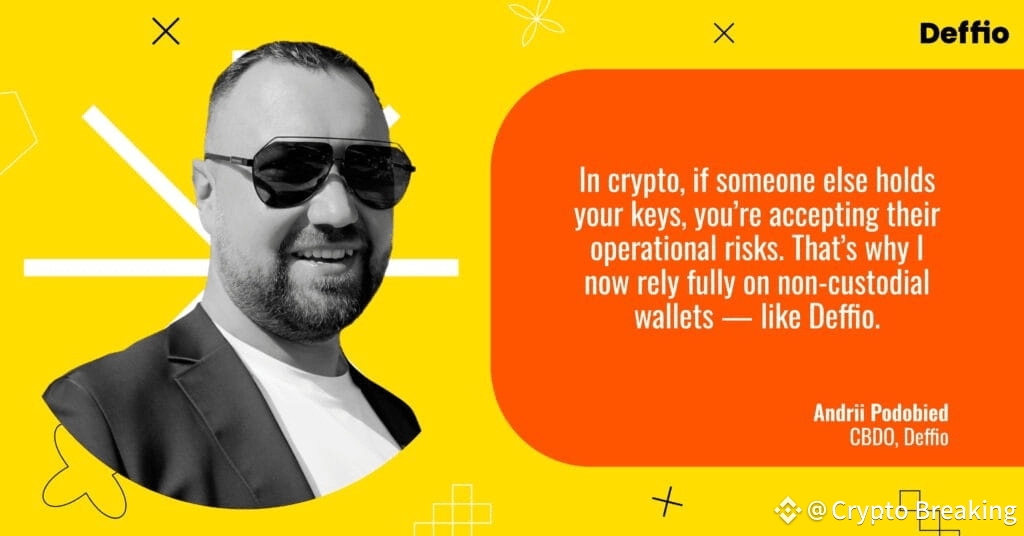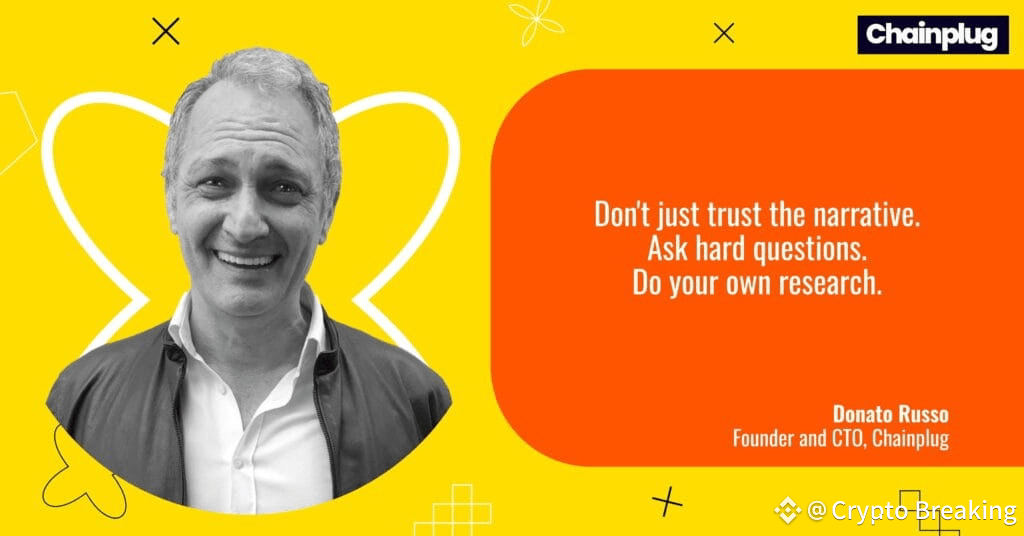
Last week, the NapulETH event hosted a dynamic AMA session on the future of real-life crypto adoption, Web3 tools, and blockchain innovation. The session took place on X and was co-organized by Deffio, a non-custodial crypto wallet that also sponsored a community giveaway.
So, please, meet the participants.
Moderator: Lorenzo Ceppaluni, Co-founder of NapulETH
Lorenzo Ceppaluni is the co-founder of NapulETH, a grassroots Ethereum community and event series based in Naples, Italy. Passionate about Web3 education and real-world crypto adoption, Lorenzo brings together builders, users, and thinkers to explore the next phase of decentralized technology.
“We touched on everything from daily crypto use to self-custody and scams — now it’s your turn. Ask questions, challenge ideas, and be part of building safer, more accessible Web3 tools.”

Andrii Podobied, CBDO at Deffio
Andrii introduced Deffio as a non-custodial wallet designed with everyday users in mind — not just developers.
“We started with the basics: a secure, self-custody wallet. But we’re building much more — features like crypto cards, staking, and on/off-ramp tools will follow soon.”
He emphasized Deffio’s commitment to usability and seamless crypto adoption in daily life.
Donato Russo, Founder and CTO at Chainplug
Donato shared his journey through European startup ecosystems and introduced two projects:
Backstage.global
Neural Blockchain — an ambitious concept merging blockchain, IoT, and AI
“We’re working on the convergence of blockchain, IoT, and artificial intelligence — the next leap in infrastructure.”
Here are some of the top insights shared by the speakers.
Topic #1: How Crypto Fits into Daily Life
 Andrii Podobied: Yes, you can live on crypto
Andrii Podobied: Yes, you can live on crypto
“I receive payments in crypto and use cards to pay in stores — legally and easily. It’s already real.”
He explained that with crypto-linked cards, users can make everyday purchases, send payments, and manage their finances seamlessly.
 Donato Russo: Crypto as a Reflection of Ethics and Lifestyle
Donato Russo: Crypto as a Reflection of Ethics and Lifestyle
Donato took a philosophical turn, describing crypto as a way to digitize our personal values.
“I earn tokens by walking with the Sweat app — I get rewarded for not polluting. It’s good for the planet and for health.”
He predicted that in the near future, each person could have their own personalized token that reflects their actions, ethics, and skills.
Topic #2: Custody vs. Self-Custody: Who Really Holds Your Keys?
The discussion then turned to a critical topic for anyone in crypto — custodial vs. non-custodial wallets.
 Donato Russo: Identity, Regulation & Personal Responsibility
Donato Russo: Identity, Regulation & Personal Responsibility
“We’re entering a phase where the EU will enforce digital identity protocols like eIDAS 2.0 — even banks will have digital passports.”
Donato emphasized that while regulators aim to increase wallet security, scammers still exploit human behavior rather than tech flaws
“The biggest risk isn’t the wallet itself — it’s how people are misled into trusting the wrong things. Always double-check everything you do.”
 Andrii Podobied: “If you don’t hold the keys, you don’t own the assets”
Andrii Podobied: “If you don’t hold the keys, you don’t own the assets”
Andrii broke down the difference using a clear real-world example:
“Everyone trusted FTX. A week before their collapse, they looked like the best exchange. But when they fell, people lost billions.”
He compared this to banks — when a bank collapses, you lose your money unless there’s a guarantee fund.
“In crypto, if someone else holds your keys, you’re accepting their operational risks. That’s why I now rely fully on non-custodial wallets — like Deffio.”

Topic #3: Is Self-Custody Too Much Responsibility?
While self-custody offers control, it also introduces real risks — and not everyone may be ready. The speakers explored whether mainstream users are prepared to hold their own keys.
 Andrii Podobied: We’ve Come a Long Way — But Education is Still Key
Andrii Podobied: We’ve Come a Long Way — But Education is Still Key
“Five years ago, it wasn’t responsible to recommend non-custodial wallets to most users. But today, with so many bankruptcies and scams, people are starting to take security seriously.”
Andrii stressed that especially for long-term savings, OTC deals, or serious crypto investing, non-custodial wallets are becoming the standard, but users must be aware:
“If you lose your keys — you lose access forever. There’s no backup. People must understand this.”
 Donato Russo: Not Everyone Wants Full Control
Donato Russo: Not Everyone Wants Full Control
“Even though money is crucial, many people still hesitate to manage their own keys.”
For beginners, especially the less tech-savvy or older users, custodial solutions may still be acceptable — particularly for small amounts:
“In Europe, bank accounts are insured up to €100K. If a regulated exchange fails, you might get your funds back — but it will take time.”
 Andrii Podobied: Regulation Brings Options — and Trust
Andrii Podobied: Regulation Brings Options — and Trust
“With frameworks like MiCA, and more transparency around who’s behind crypto services, users can now make informed choices — whom to trust and how to manage their assets.”
He suggested that market maturity, growing regulation, and support from big tech players like Apple and Google are paving the way for safer and more flexible custody decisions.
Topic #4: Crypto Security: Real Stories, Real Lessons
Security risks and scams are still widespread in Web3. The speakers shared personal stories and practical advice on how to avoid phishing attacks, fake apps, and costly mistakes.
 Andrii Podobied: A Costly Lesson in Clicks
Andrii Podobied: A Costly Lesson in Clicks
“I got an email saying I received tokens from a project I trusted. Instead of verifying the link, I Googled it, clicked the first result, and connected my wallet. It emptied instantly.”
Andrii lost around $1,000 — a relatively small amount, but a powerful wake-up call. His advice?
Always use verified links from trusted platforms like CoinMarketCap
Never trust emails or links without double-checking
If a project isn’t listed or verified — don’t engage with it
 Donato Russo: Blockchain Isn’t as Decentralized as We Think
Donato Russo: Blockchain Isn’t as Decentralized as We Think
Donato reminded the audience that decentralization is still a myth in many cases.
“We think we can trust blockchain — but blockchain isn’t yet decentralized.”
He encouraged users to go beyond marketing buzzwords and ask themselves:
Has the project delivered any working tech?
Is there real utility behind the token?
Have you read the whitepaper?
“Don’t just trust the narrative. Ask hard questions. Do your own research.”

 Lorenzo Ceppaluni: Job Scam Turned Crypto Drain
Lorenzo Ceppaluni: Job Scam Turned Crypto Drain
A chilling example reminded everyone that scams go beyond fake tokens and phishing links:
“A friend of mine lost everything not through DeFi, but through a fake job application.”
“The more tech advances, the more sophisticated scams become. Stay alert — always.”
The scam involved downloading malware disguised as HR software, which silently accessed and drained his wallet.
Key advice:
Double-check everything — even outside crypto platforms
Be cautious of seed phrase storage and what software you install
This AMA session brought together industry voices to explore the realities of crypto adoption — from everyday use and self-custody to security risks and future-forward ideas. It was a candid, insightful conversation that highlighted both the progress and challenges of building in Web3.
What’s Next? Join Us in Naples This July!
This AMA was just the beginning. From real-life crypto use to self-custody, on-ramps, and the future of identity — we explored the challenges and opportunities shaping Web3 today.
But the real conversations happen in person.
Join the NapulETH community offline this summer for three days of talks, workshops, and connection with builders, dreamers, and doers from across the Ethereum and crypto space.
 NapulETH 2025
NapulETH 2025
 17–19 July, 2025
17–19 July, 2025
 Naples, Italy
Naples, Italy
Let’s co-create the future of crypto — see you in Naples!
This article was originally published as Key Takeaways from the AMA Session «Crypto in daily life: demystifying wallets, payments and security» on Crypto Breaking News – your trusted source for crypto news, Bitcoin news, and blockchain updates.
